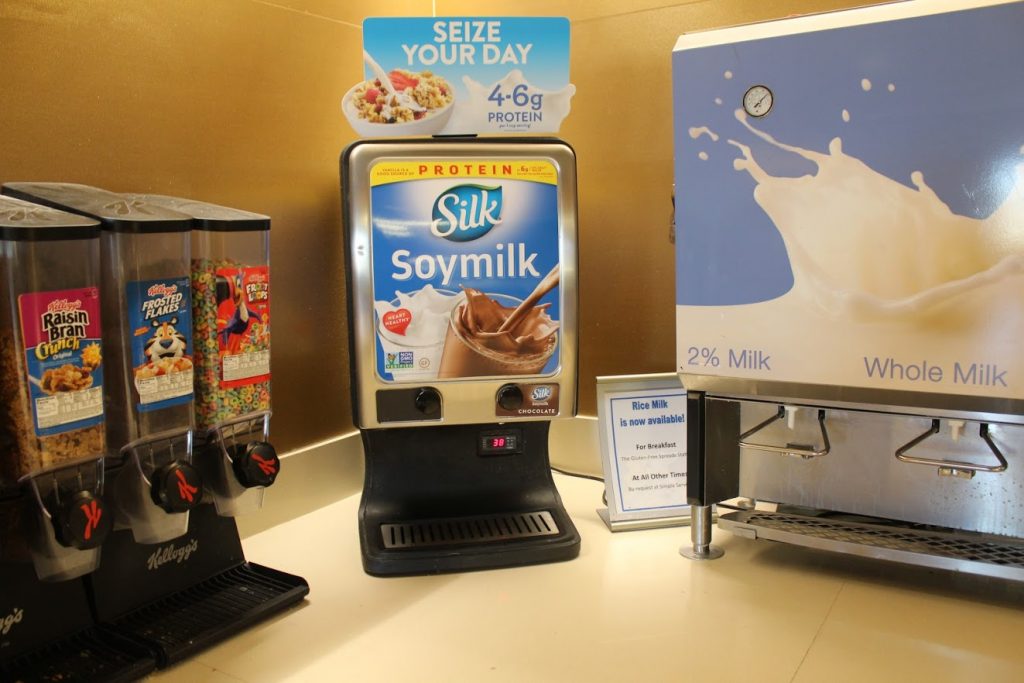Ditch dairy: for cows, the environment and your health
3 min read
UMW offers a number of dairy free options including soy milk at the 4th floor of the UC. (Kaley Mccusty | The Blue & Gray Press)
By JOSEPHINE JOHNSON
Staff Writer
When asked, “what will make you grow big and strong?” the image of a tall glass of milk comes to mind for many. They think of a peaceful farm of free-range happy cows roaming along a green pasture, contently waiting for their morning milking. However, the happy cow is only a marketing technique–and it’s not all green pastures.
In light of the growing awareness to avoid consuming dairy products all together, I encourage the movement to ditch dairy.
For decades, the dairy industry has been paying its way into the media, education systems and nutritional programs, convincing the vast majority that dairy consumption is a necessity. Campaigns like “Got Milk?” have been created to promote dairy milk-drinking across age groups. Much like the cliche of “an apple a day,” the campaign was designed in a way that encourages people to think they need far more calcium in their diets than they actually do, and that calcium can best be derived from dairy milk.
We’re also never shown calves being ripped from their mothers’ side hours after birth. In order to produce milk, the female cow is forcibly, artificially impregnated and gives birth at least once every year, having either a female that will grow to share the same fate or a male that will be slaughtered and sold for veal. Her offspring is almost immediately taken away from her and placed in a crate, alone and scared. It is not uncommon for mother cows to be up at night crying for their babies. As extremely maternal animals, cows experience the pain of losing a calf.
That is not the only inhumane practice that goes into getting you that tall glass of milk in the morning. The dairy cows are also modified to be complicit and do nothing all day. Horns are sawed off, tails are cut and they are shoved into tiny spaces to sit and wait to be milked. The treatment of cows in this industry is arguably worse than even in the meat industry. In fact, animal lovers and vegetarians alike have been shocked to find out that the dairy industry is the meat industry. Once the dairy cows collapse after an average of 4-5 years of being physically, sexually and emotionally tortured, they are dragged away to be slaughtered and sold as beef. The average lifespan of a healthy cow is more than 20 years.
For some dairy consumers, the idea of animal cruelty isn’t enough to inspire them to put back the gallon–or perhaps they just choose to not acknowledge it. However, the impact on their personal health may persuade them.
Excessive calcium actually isn’t a good thing. The connection between high milk consumption and its association with mortality and fracture in women and men was conducted in a cohort study by Swedish researchers. The research revealed that dairy milk drinkers are more likely to develop certain cancers and osteoporosis. Also, that high milk intake was associated with one cohort of women and another cohort of men. Fear not that by giving up milk you will lose all calcium. There are still so many plant-based options like almond milk, soy milk and other vegan/grain and plant-based items to fulfill a person’s needs.
In recent years, it has become easier to sustain a dairy-free diet on campus with the addition of Katora, Panera and staple UC stations. Katora is a great place to go dairy-free since it has many milk alternatives for your coffee, and even vegan cream cheese to smother your bagels.
Dairy consumption is known to cause a number of health issues, and the dairy industry is inhumane and not at all environmentally friendly. Going without dairy is not only better for the environment and cows, but also for your health. Save the milk for the baby cows.











